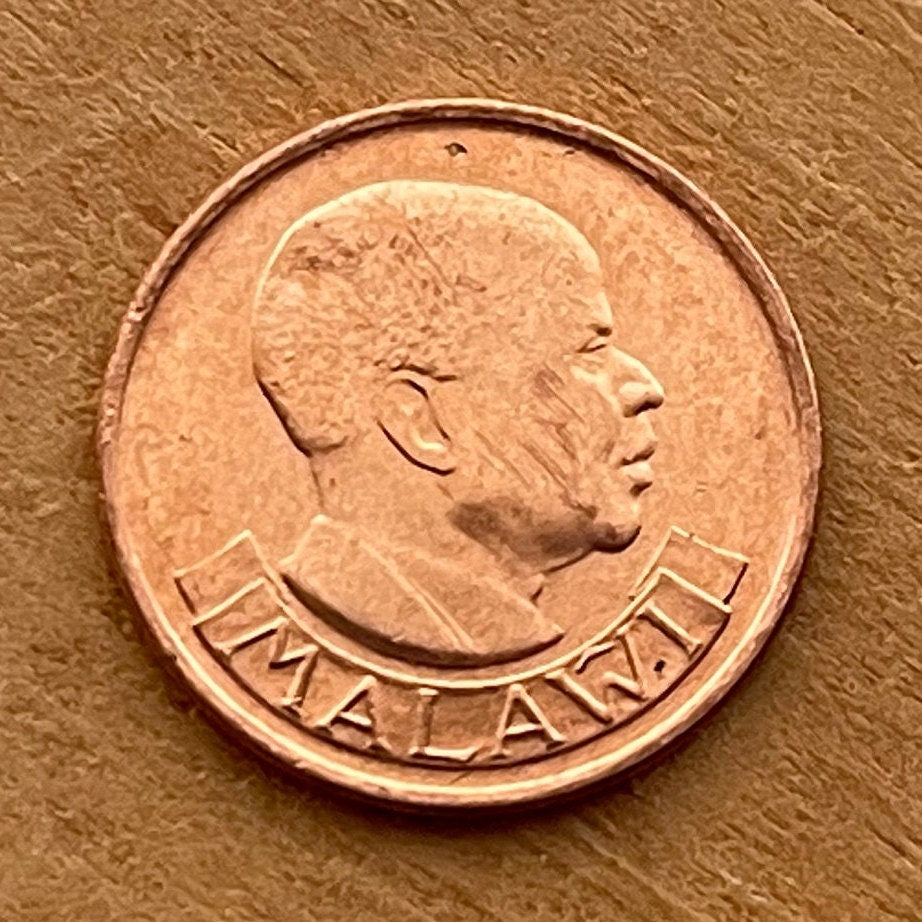elemintalshop
Wild Rooster & Hastings Kamuzu Banda 1 Tambala Authentic Coin Money for Jewelry and Craft Making (Free Range Indigenous Chicken)
Wild Rooster & Hastings Kamuzu Banda 1 Tambala Authentic Coin Money for Jewelry and Craft Making (Free Range Indigenous Chicken)
Couldn't load pickup availability
Wild Rooster & Hastings Kamuzu Banda 1 Tambala Authentic Coin Money for Jewelry and Craft Making (Free Range Indigenous Chicken) (President for Life)
Reverse: Wild rooster divides value and date
Lettering: 1 TAMBALA
Obverse: Portrait of Hastings Kamuzu Banda right (Independence Leader, Prime Minister & then President of Malawi for life) (1898-1997)
Lettering: MALAWI
Features
Issuer Malawi
Ruling authority Republic (1966-date)
Hastings Kamuzu Banda (1966-1994)
Type Standard circulation coin
Years 1984-1994
Value 1 Tambala
0.01 MWK = USD 0.000012
Currency Kwacha (1971-date)
Composition Copper plated steel
Weight 1.8 g
Diameter 17.2 mm
Thickness 1.05 mm
Shape Round
Orientation Medal alignment ↑↑
Number N# 13177
References KM# 7.2a
WHAT EXACTLY ARE INDIGENOUS CHICKENS?
Smaller bodies, frizzled feathers and feather-less or naked necks are traits that confer great resilience to indigenous poultry in the places we work.
Chickens have lived in rural villages throughout Africa and the Pacific for centuries and have adapted to the local environment and conditions. These village chickens are referred to as ‘indigenous’, ‘native’, ‘local’ or ‘traditional’ poultry and are easy to distinguish from standardised commercial or heritage breeds.
Selection pressures over the years have yielded traits such as hardiness in more intense weather conditions, local disease resistance, excellent feed conversion ratio (meaning they can be sustained with little feed supplementation) and are multi-purpose (eggs and meat) in a free-range system. They generally do not conform to standardised breed ‘looks’ as many backyard breeds do. However, physical traits such as light carcass weight, naked necks and frizzled feathers are common among indigenous birds, as they have adapted for heat tolerance and ability to evade predators (in the case of their small body).
They also hatch their own eggs and look after their chicks well, therefore ensuring a continuous supply of replacement stock if they are kept healthy and effort is made to protect them from predators.
Compared to commercial meat chickens, these birds are leaner with more nutrient-dense meat (and more often than not quite popular and pricier according to local taste).The hens lay a smaller number of eggs per clutch and fewer clutches per year as they need time to brood and care for their young chicks. Indigenous chicken eggs tend to be smaller than commercial eggs but the ratio of yolk to white is higher, improving the overall nutrient density of the egg. Critically, indigenous birds are great scavengers and this saves their owners time, money and reduces competition for feed such as maize that is eaten by household members.
Indigenous chickens are a valuable reservoir of diverse genes. More continues to be learned about their genetic makeup, so that the wider gene pool of these so called ‘native ecotypes’ can be conserved as a valuable global food resource for a climate smart future.
Source: https://kyeemafoundation.org/indigenouschickens/
********
Wikipedia:
Hastings Kamuzu Banda (c. 1898 or 1906/1907 – 25 November 1997) was the Prime Minister and later President of Malawi from 1964 to 1994 (for the first year of his rule as it achieved independence in 1964, Malawi was the British protectorate of Nyasaland). In 1966, the country became a republic and he became president. His rule has been characterized as a "highly repressive autocracy."
After receiving much of his education in ethnography, linguistics, history, and medicine overseas, Banda returned to Nyasaland to speak against colonialism and advocate independence from the United Kingdom. He was formally appointed Prime Minister of Nyasaland, and led the country to independence in 1964. Two years later, he proclaimed Malawi a republic with himself as president. He consolidated power and later declared Malawi a one-party state under the Malawi Congress Party (MCP). In 1970, the MCP made him the party's President for Life. In 1971, he became President for Life of Malawi itself.
A renowned anti-communist leader in Africa, he received support from the Western Bloc during the Cold War. He generally supported women's rights, improved the country's infrastructure and maintained a good educational system relative to other African countries. However, he presided over one of the most repressive regimes in Africa, an era that saw political opponents regularly tortured and murdered. Human rights groups estimate that at least 6,000 people were killed, tortured and jailed without trial. As many as 18,000 people were killed during his rule, according to one estimate. He received criticism for maintaining full diplomatic relations with the apartheid government in South Africa.
By 1993, amid increasing domestic and international pressure, he agreed to hold a referendum which ended the one-party system. Soon afterwards, a special assembly ended his life-term presidency and stripped him of most of his powers. Banda ran for president in the democratic elections that followed and he was defeated. He died in South Africa on 25 November 1997.
Share










Bought as a gift, friend loves it.
Love it! Fast shipping, well packaged.









